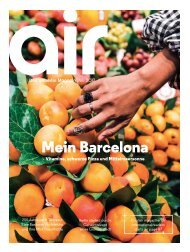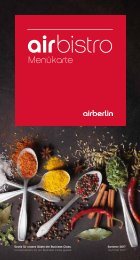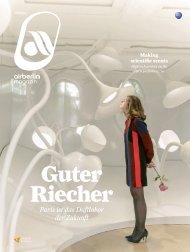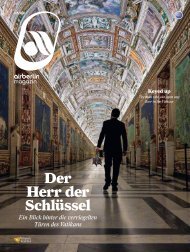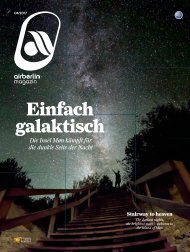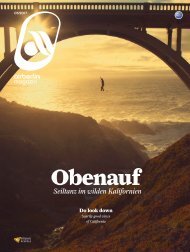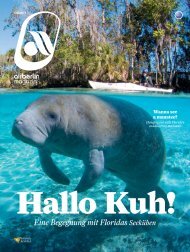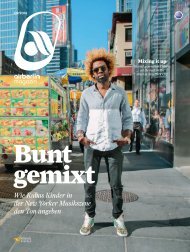Erfolgreiche ePaper selbst erstellen
Machen Sie aus Ihren PDF Publikationen ein blätterbares Flipbook mit unserer einzigartigen Google optimierten e-Paper Software.
60<br />
An einem<br />
regnerischen<br />
Dienstag<br />
sitzt eine<br />
Waldohreule<br />
in<br />
Tokio auf dem Arm einer<br />
Arbeitssuchenden. Eulencafés sind der größte<br />
neue Trend in Sachen Tiercafés, alle paar Wochen<br />
eröffnet ein neues. Im Ikefukuro im Norden der<br />
<strong>Stadt</strong> leben knapp 20 Eulen. Sie sitzen auf Stangen,<br />
die an den Wänden aufgereiht sind. Im Hintergr<strong>und</strong><br />
spielt Klaviermusik. Gruppen von r<strong>und</strong> 15<br />
Leuten haben jeweils eine St<strong>und</strong>e mit den Tieren.<br />
Die Besucher wirken aufgeregt, als sie sich die<br />
Hände desinfizieren <strong>und</strong> die Straßenschuhe gegen<br />
Pantoffeln tauschen. Die Rollläden sind geschlossen,<br />
denn Eulen sind lichtempfindlich. Und sie<br />
riechen streng. Dennoch laden die Gäste die Tiere<br />
auf Arme <strong>und</strong> Köpfe <strong>und</strong> machen Bilder davon mit<br />
ihren Smartphones. Die Hocker in der Mitte des<br />
Raums <strong>und</strong> der kleine Kühlschrank mit Getränken<br />
bleiben meist ungenutzt.<br />
„Ein wirkliches Café ist das hier nicht. Die Tiere<br />
sind der Fokus“, sagt Mari Asaka, die Besitzerin<br />
der zwei Dutzend Eulen <strong>und</strong> dem Laden, in dem<br />
sie wohnen. Asaka hatte immer Haustiere, erzählt<br />
sie. Eine Katze, einen H<strong>und</strong>, einen Wellensittich,<br />
einen Zwergpapagei. Dann begann sie mit Eulen<br />
<strong>und</strong> wurde süchtig. Eine nach der anderen ließ sie<br />
in ihr enges Apartment einziehen. „Wie im Zoo!“<br />
2014 folgte die Entscheidung, sie musste ihr Hobby<br />
zum Beruf machen. „Ich dachte, es wäre besser,<br />
wenn ich ein Eulencafé betreibe <strong>und</strong> nicht<br />
irgendwelche Geschäftsleute, die nur das Geld<br />
><br />
On a rainy Tuesday in Tokyo, a long-eared<br />
owl sits on a job-seeker’s head. Owl cafes are the<br />
latest big thing in the country’s animal cafe trend,<br />
with a new one opening every few weeks.<br />
Ikefukuro in the north of the city helped set the<br />
trend. Its main room has closed shutters and<br />
several plush stools in the centre that hardly<br />
anyone sits on. Almost 20 owls stand in a row on<br />
their wall perches before settling unto dozens of<br />
visitors’ arms and heads. Piano music<br />
accompanies the scene. There’s a distinct smell of<br />
birds. Soft drinks in plastic bottles are available<br />
from a small fridge, but nobody is drinking.<br />
Instead, the visitors load themselves up with bird<br />
after bird and take pictures on their smartphones.<br />
“This isn’t a real cafe. The creatures are the<br />
focus,” says Mari Asaka, owner of two-dozen<br />
owls and the shop where they live. Asaka explains<br />
that she always had pets: a cat, a dog, a budgie and<br />
a dwarf parrot. Then she moved on to owls and<br />
quickly became hooked, letting one after the other<br />
move into her cramped apartment. “My home<br />
was like a zoo,” she says. In 2014 she decided to<br />
turn her hobby into a career. “I thought it’d be<br />
better for someone who really likes animals to run<br />
an owl cafe, not some businessman or other who<br />
only sees money and a boom,” she says.<br />
The day gets into full swing at noon, when<br />
people arrive in groups of up to 15. The visitors<br />
swap their street shoes for slippers and disinfect<br />
their hands. Asaka gives them an introduction:<br />
camera flashes are forbidden and loud noises<br />
avoided. “These are sensitive creatures,” says<br />
Asaka. The day continues, group after group, owl<br />
after owl and photo after photo.<br />
Asaka wants to create an owl community, in<br />
the style of the dog owners who walk their pets<br />
together. Asaka says owl enthusiasts haven’t got<br />
to know each other yet. “I’ve set up tables and<br />
chairs to encourage people to interact,” she says.<br />
Some visitors actually do end up exchanging<br />
phone numbers.<br />
But why owls, exactly? “The Japanese often<br />
live very serious lives and are tired from their<br />
long workdays,” says Asaka. In the owl cafe, just<br />
a few <strong>und</strong>ergro<strong>und</strong> stations away, they find a<br />
world of flapping wings, baby owls and cooing.<br />
The job-seeker from earlier is Johan K, a<br />
32-year-old who paid €12 to visit the owl cafe.<br />
Johan K tries out a new animal cafe every few<br />
weeks and has already snuggled up to rabbits,<br />
dogs, cats, reptiles and goats.<br />
On a sunny Wednesday, a goat is<br />
walking along Tokyo’s streets in a different part<br />
of the city. With her white coat and pink nose on<br />
the asphalt, she strains forwards towards the<br />
leaves scattered on the gro<strong>und</strong> – and towards ><br />
IKEFUKUROU<br />
Wo? / Where?<br />
Minami<br />
Ikebukuro 1-17-1,<br />
Toshima-ku,<br />
171-0022<br />
Wann? / When?<br />
Mo-Fr 13-16:00<br />
<strong>und</strong> 18-19:00,<br />
Sa/So 12-18:00,<br />
Reservierung<br />
nötig / Mon-Fri<br />
1-4pm and 6-7pm,<br />
Sat-Sun noon till<br />
6pm, reservation<br />
essential<br />
Wieviel? / How<br />
much? 1400 Yen<br />
pro St<strong>und</strong>e (ca. 10<br />
Euro) / 1400 yen<br />
per hour (aro<strong>und</strong><br />
€10)<br />
ikefukuroucafe.<br />
com





